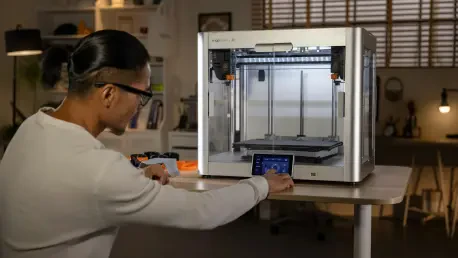Jada Okaikoi, an exemplary biomedical engineering student, has recently been recognized for her groundbreaking endeavors in tissue engineering and 3D bioprinting, with a notable focus on women’s health research. Thanks to receiving a National Science Foundation Graduate Research Fellowship, she has been afforded financial independence and research flexibility, allowing significant advances in her field. Her academic journey, underscored by innovation and resilience, is setting a precedent in the medical science community. The transformative potential of Okaikoi’s work is evident, as biomedical engineering continues to be a frontier for addressing pressing health challenges. Her contributions are pivotal in advancing the understanding and treatment of diseases that predominantly affect women.
Innovation in Biomedical Engineering
Biomedical engineering is witnessing an unprecedented surge in innovation, particularly within tissue engineering, with notable contributions from promising researchers like Jada Okaikoi. Her work exemplifies the profound impact of creating human tissue in laboratories, offering invaluable insights into disease mechanisms and developing targeted therapies, especially in women’s health. This burgeoning field not only promises to deepen scientific understanding but also presents practical opportunities for real-world applications that could revolutionize healthcare. However, such advancements come with their own set of challenges, from ensuring reproducibility and scalability to integrating complex biological systems. Okaikoi’s pioneering research in tissue engineering is emblematic of both the strides being made in the discipline and the high stakes involved in translating laboratory breakthroughs into medical science.
Okaikoi has demonstrated remarkable perseverance and creativity to overcome the inherent obstacles presented by tissue engineering, forging a path towards breakthroughs that could redefine treatment paradigms for female-specific diseases. By utilizing 3D bioprinting technology, she aims to replicate and modify uterine tissues to pave the way for advances in drug screening for conditions like preterm labor, transforming speculative ideas into tangible solutions. Her relentless pursuit of knowledge and application speaks to the larger narrative of innovation driving progress in biomedical engineering. As research continues to evolve under her guidance, the medical community anticipates the potential ripple effects of her work, fostering novel approaches to women’s health that are both scientifically rigorous and practically feasible.
Recognitions and Support Networks
Okaikoi’s receipt of the prestigious NSF Graduate Research Fellowship marks a pivotal moment in her academic journey, offering her financial backing and research freedom essential for exploring novel ideas and fostering innovation. This acknowledgment by a reputable organization underscores her exemplary dedication and potential to push the boundaries of biomedical engineering. Support networks have played an integral role in her success, providing the necessary mentorship and academic resources to fuel her ambitions. Collaborations with distinguished faculty members like Heather Burkin, coupled with her experiences at the University of Nevada, Reno, and the Massachusetts Institute of Technology (MIT), have created a nurturing environment that champions pioneering discoveries.
The significance of mentorship cannot be understated in shaping Okaikoi’s research trajectory, as seasoned experts provide valuable guidance and perspectives that spur academic and professional growth. Such collaborations exemplify the critical role academic hubs play in nurturing emerging talent, ensuring that students like Okaikoi have the support and facilities needed to pursue ambitious research ventures. Her summer research at MIT, focused on evaluating drug quality for endometriosis treatment, showcases her commitment to exploring emerging therapies and confronting medical challenges head-on. Through these experiences, Okaikoi continues to cultivate an environment where innovation thrives, blending research excellence with practical healthcare solutions.
Translational Research and Practical Applications
Jada Okaikoi has made significant progress in leveraging 3D bioprinting technology to innovate uterine tissue models, focusing on drug screening for preterm labor, showcasing the profound implications of translational research in bridging laboratory findings with practical healthcare needs. Her work underscores the importance of transforming theoretical discoveries into actionable medical solutions, a trend gaining momentum in biomedical engineering. Harnessing these emerging technologies, Okaikoi’s research is pivotal in addressing critical health issues that impact women globally, driving towards effective therapies while laying the groundwork for future advances. Translational research remains essential for ensuring that scientific breakthroughs reach patients and yield tangible benefits for public health.
Okaikoi’s dedication to translating her scientific inquiries underscores the broader trend within the academic community, emphasizing the imperative of making research impactful in a real-world context. The promising outcomes of her endeavors serve as a testament to the importance of innovative approaches and interdisciplinary collaboration for advancing healthcare. As her research progresses, the medical community anticipates further advances in therapeutic strategies and potential applications. The commitment to translational research not only promotes scientific advancement but also fosters an environment committed to addressing pressing societal health needs, positioning Jada Okaikoi’s work as a touchstone for pioneers in biomedical engineering.
Community and Leadership
Biomedical engineering is seeing a remarkable wave of innovation, especially in tissue engineering, with significant contributions from researchers like Jada Okaikoi. Her work underscores the transformative potential of synthesizing human tissues in labs, offering deep insights into disease dynamics and paving the way for tailored therapies, notably in women’s health. This rapidly expanding field promises to enhance scientific understanding while opening up practical applications that could revolutionize healthcare. However, these advancements pose challenges, like ensuring reproducibility, scalability, and integration of complex biological systems. Okaikoi’s groundbreaking research in tissue engineering highlights the progress within the discipline and the stakes involved in translating lab breakthroughs into medical practice. Her use of 3D bioprinting technology aims to replicate and modify uterine tissues to advance drug screening for conditions like preterm labor, turning theoretical ideas into tangible solutions, which could reshape approaches to female-specific diseases.









